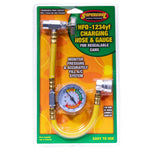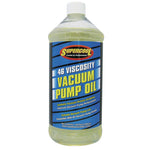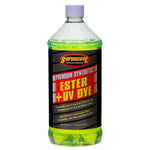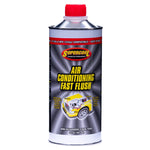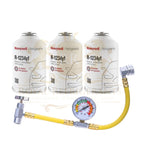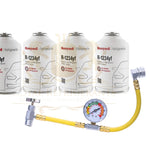You have no items in your shopping cart.
Everything You Need to Know About Can R407C Be Mixed With R22 for HVAC and Automotive
In the HVAC and automotive industries, refrigerants play a crucial role in system efficiency and environmental impact. Two commonly discussed refrigerants are R22 and R407C. As older R22 systems phase out and newer refrigerants like R407C become popular, many technicians ask: Can R407C be mixed with R22? This article explores that question in detail.
What Are R22 and R407C?
R22 (Chlorodifluoromethane): A hydrochlorofluorocarbon (HCFC) refrigerant widely used in residential and commercial HVAC systems for decades. Due to its ozone depletion potential, R22 is being phased out under international regulations.
R407C: A hydrofluorocarbon (HFC) blend refrigerant designed as a more environmentally friendly replacement for R22. It has no ozone depletion potential and better efficiency characteristics.

Can R407C Be Mixed with R22?
No, R407C should not be mixed with R22.
Different Chemical Compositions:
R22 is a single-component refrigerant, while R407C is a blend of three HFC refrigerants (R32, R125, and R134a). Their properties and behaviors are different.
Lubricant Incompatibility:
R22 systems use mineral oil-based lubricants, whereas R407C requires synthetic polyolester (POE) oils. Mixing these can lead to poor lubrication and compressor failure.
Performance Issues:
Mixing refrigerants can cause inefficient cooling, pressure imbalances, and damage to system components.
Legal and Warranty Risks:
Many manufacturers and regulations prohibit mixing refrigerants due to safety and performance concerns.
What If Your System Has R22 and You Want to Switch to R407C?
Retrofit Considerations:
Transitioning from R22 to R407C requires careful retrofitting, including replacing lubricants, seals, and sometimes other components.
Professional Service:
Only trained HVAC professionals should perform retrofits to ensure system safety and efficiency.
Automotive Applications
In automotive air conditioning, R22 was never widely used. Modern vehicles commonly use R134a or newer refrigerants. Mixing R22 and R407C in automotive systems is not recommended and generally irrelevant.
Conclusion
Mixing R407C with R22 is not advisable due to chemical, lubricant, and performance incompatibilities.
Retrofitting R22 systems to use R407C requires professional handling.
Always follow manufacturer guidelines and regulations for refrigerant use.
 English
English

